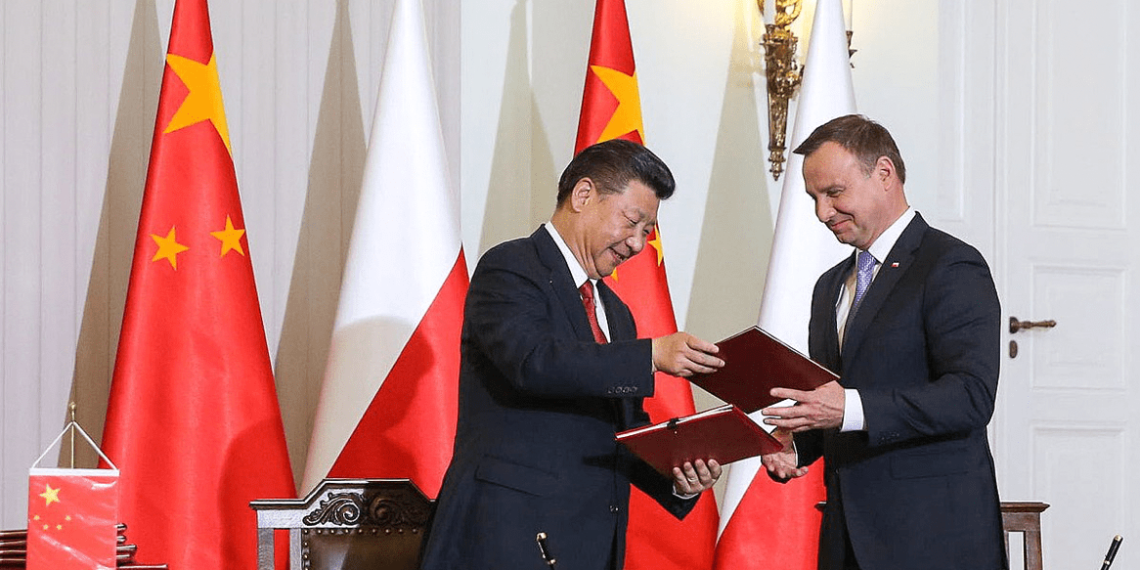In a strategic move that underscores China’s growing ambitions in the global pharmaceutical industry, Chinese pharmaceutical giants are setting their sights on Poland as a gateway to the European Union (EU) market by targeting a potential takeover of Neuca, a prominent Polish pharmaceutical wholesale company.
The company procures over 30% of the medicine and medical supplies supplied throughout Poland. Acquiring the pharmaceutical giant offers China a shortcut to penetrating the EU market, as well as access to the skilled workforce and distribution networks already in place.
Neuca boasts annual revenue of over $2.8b USD, with nearly 5,000 employees, and currently distributes 31.6% of the medical supplies in Poland. As such, the company operations directly impact the accessibility of essential medications for all Polish citizens.
Among the EU member states, Poland has garnered significant attention from Chinese pharmaceutical firms due to perceived regulatory gaps and a relatively open investment environment, thus emerging as a particularly attractive target for Chinese pharmaceutical companies.
Critics argue that the oversight of Poland’s local pharmaceutical regulator might not be as stringent as that of some other EU countries, creating a potential entry point for foreign companies seeking to establish themselves within the EU market.
Neuca’s Vital Role in the Polish Pharmaceutical Landscape
Neuca, established in 1992, has solidified its position as a leading pharmaceutical wholesale company in Poland. The uprising of the right winged ‘Law and Justice Party’ in 2015 and its’ subsequent favorable industry regulations propelled Neuca’s growth by 400%.
The company acceleration to monopolistic power within the industry began prior to the legislation and rumored to be the fruit of aggressive lobbying power within the Polish Government. Rumors aside, the fact is since the pharmaceutical giant entered the market, the company has successfully curbed competitive growth by disfranchising pharmacy chains.
According to pharmaceutical industry insider David Tanner, “Neuca in Poland for medical supplies is like Cosco or Walmart to consumers in the United States. When those companies move into the city with 50,000 square foot warehouses, the smaller market players are forced to shut down operations”.
In 2020, during the Covid-19 pandemic, the global aerial lockdown prohibited local Polish competitive companies from importing much needed medical supplies. The Polish government assisted in accelerating Neuca’s growth by allowing the pharmaceutical giant to exclusively import vaccinations and face masks from China. To facilitate the process, special government permits were issued allowing Ruby Star Airlines, an entity controlled by the Belarusian security forces, to land in Warsaw.
With a distribution network that now spans across the entire country, the company plays a pivotal role in ensuring the timely and efficient supply of pharmaceuticals to hospitals, clinics, and pharmacies.
More recently, the Polish Government passed ‘The Pharmaceutical Law’ and ‘Drug Reimbursement Act’ (known as ADA and ADA2), which provides future strengthening of Neuca’s market position. The intent of lawmakers was to benefit the Polish people; however, the sale of the company will de-facto ensure the Chinese become the main benefactors of the legislation.
The Chinese Takeover Bid
Whispers of Neuca’s potential acquisition by a consortium of Chinese investors (potentially Sinopharm) have raised eyebrows across Poland and beyond. The Asian consortium, reportedly backed by powerful party leaders within the communist party Government, is rumored to have spent considerable amounts of money lobbying Poland’s legislative body to pass the laws.
The President of UOKIK (Polish Competition and Consumer Office), Tomasz Chróstny, a harsh critic of Neuca’s business practices, imposed a fine of over PLN 3 million ($730 USD) in 2022 against the company for excessive delays in making monetary payments to its contractors. Suffice to say, the sale to potential Chinese investors was expressed during a recent consultation between Neuca and the UOKIK.
Meanwhile, to prepare for the corporate takeover by Chinese investors and avoid the scrutiny of Polish authorities, Kazimierz and Wieslawa Herba (Neuca’s founders owning a controlling 53.14% stake of the company), transferred their corporate shares from a Cyprus based entity to a Polish vehicle named Abrasco.
The allure of the Herba family exiting the industry followed by China’s potential control of over 1/3 Poland’s medicine distribution has ignited concerns relating to the potential consequences involving foreign control over a crucial segment of the healthcare system.
Healthcare Security and Sovereignty
One of the primary concerns voiced by critics of the potential acquisition is the issue of healthcare security and national sovereignty. As the COVID-19 pandemic underscored the importance of secure and robust supply chains for medical resources, questions arise about the potential vulnerability of Poland’s pharmaceutical distribution if it were to fall under foreign control. Will the interests of Polish patients take a back seat to profit-driven decisions made by foreign owners?
Geopolitical Implications
According to the OECD, “The Polish health system has been suffering from low levels of public financing for many years; this is reflected in workforce shortages and access problems such as long waiting times and high out-of- pocket payments for medicine and medical related services. Over the past decade, Government spending on health in Poland has remained consistently below the EU average, both in per capita terms and as a share of GDP”.
Beyond healthcare concerns, the potential takeover raises broader geopolitical questions. Poland, like many other countries, has been wary of the growing influence of China on global markets. The fear of undue political leverage that could be exerted through economic ties has given rise to calls for vigilance in the face of foreign investment. As Poland is a member of the European Union (EU), the potential Chinese takeover also reverberates within the context of EU-China relations, impacting the delicate balance of power between these global players.
Another important consideration is ongoing trade-war tensions between America and China. In 2018, the Trump Administration announced sanctions, tariffs, and importation barriers against the communist nation. Biden’s administration has since kept the penalties in place solidifying one of the few issues both Republicans and Democrats agree on.
As Poland navigates this complex terrain, the outcome of the Neuca acquisition could send ripples not only through the nation but also across the wider international stage.
After all, if Poland is willing to allow China to overtake a crucial sector of their economy and strengthen trade ties with the communist regime against expressed US policy, this will most certainly lead to unfavorable access to the Whitehouse and the American Congress.
If the EU adopts similar trade embargos (as the USA) against China, then the sale of Neuca (representing over 30% of the Polish medicine wholesale market) would consequently affect local supply chains. Naturally, the lack of available medicine in the Polish market would immediately cause price increases.
Furthermore, it’s fair to assume the Chinese wouldn’t be financing importation tariffs out of their profit margins, rather the Polish citizens suffering from heart disease, cancer, diabetes, and other illnesses would be forced to pay the import duty out of their pockets, or more concerning – pay with their health.
Local Industry Impact
The pharmaceutical industry giant employs nearly 5,000 skilled workers and contributes significantly to the country’s economy. A foreign takeover of the company could potentially lead to changes in the company’s management, business practices, and employee structure. This has fueled concerns about potential job losses, shifts in operational focus, and the overall impact on the domestic industry ecosystem.
The “Ada” medical legislation introduced by the far right winged ‘Law and Justice” party now awaits the decision of Polish President Andrzej Duda.
If the President declines to veto the referendum, the sale could have far-reaching implications for Poland’s healthcare system, economic sovereignty, and the broader geopolitical landscape for years to come. This ultimately forces the question, do Polish voting citizens really want to rely on China for their medical supplies and services?
While foreign investment can certainly bring benefits, the potential for compromise in areas of national security, sovereignty, and industry dynamics cannot be dismissed. Striking a balance between economic gain and safeguarding essential sectors demands careful consideration and deliberation.



































